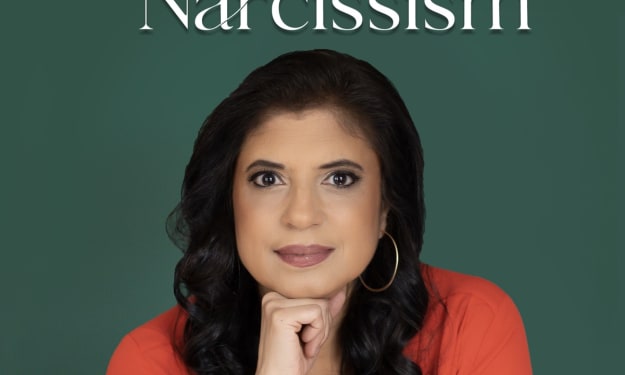Stop Cutting Yourself on People Who Hurt You
Why toxic relationships are self-harming

When we think of self-harming behaviors, we usually think of cutting, addiction, and suicide ideation. We don’t usually consider our patterns in relationships, and yet, repeatedly engaging in toxic relationships is absolutely a form of self-harm. We know it’s not good for us, and we do it anyway.
I’ve written before about how we need to stop dating our unresolved issues, but toxic relationship patterns are more than just less-than-ideal dating encounters.
If we are capable of recognizing that we’re engaged in harmful patterns, then we are actively self-harming if we continue them.
Maybe our partners are hot or the sex is so incredible that we’re loathe to give it up. There are always reasons. It’s not always low self-esteem or lack of options.
We stay in negative and harmful patterns because we’re benefitting from them in some way.
I didn’t, of course, say that the benefits are necessarily healthy ones. In fact, I would almost guarantee that they’re not. But we don’t repeat patterns unless we’re either:
- unaware of them,
- don’t know how to change them, or
- are deriving an immediate benefit from them.
A relationship with a strong push-pull component could make us feel wanted and assured of the other person’s interest. It’s not healthy, but it feels like it works for us.
A relationship filled with jealousy and suspicion could have the exact same benefit. Functional? No. Beneficial? Well, only in a deeply fucked up way.

Relationships rife with raging conflict can also have a side benefit of allowing us to get out our anger and be as explosive as we like with it. We don’t have to have uncomfortable conversations about our feelings or listen to how the other person feels. We don’t have to deal with our own responsibility inside the conflict either. Instead, we have a handy target to direct our rage toward without any of the personal growth involved in learning how to communicate and resolve conflict effectively.
For a healthy individual, this may all sound deeply messed up. But most of us understand exactly what it is to get an emotional benefit from an entirely screwed up situation. In fact, that’s how so many reality shows and intense television dramas get their audience; they allow us to experience the highs and lows of life vicariously through characters we come to know.
In entertainment, it’s understandable and acceptable. In our actual lives, participating in these relationships is a form of self-harm as serious as cutting, addiction, or suicide ideation. We aren’t acting in our own best interest and, in fact, are working to achieve the exact opposite end.
To continue to engage in a toxic relationship when we know better is to actively and willingly harm ourselves for the sake of whatever kickback we’re getting from it.
The truth is that we don’t always know how to be in healthy relationships.
They don’t feel the same as unhealthy ones, and we’re unused to navigating happiness, effective communication, and healthy boundaries. We don’t know what to do without the push-pull, the jealousy, the raging conflict, or the dramatic highs and lows.
We often have to experience the discomfort that comes with learning a new way of being in a relationship. We begin to learn to address problems head on rather than adding them to the pile of resentments we’ll air at a later date. We learn to see our own role in conflict and address it. We figure out how to create and manage boundaries. We even begin to build greater intimacy as a couple.

But none of that is easy, nor does it provide the same intense emotional experience in the short-term that our past patterns may have given. But they do lead to a greater chance at lasting happiness rather than a fleeting benefit followed by lasting misery.
We may not know how to be in healthy relationships, but we’ve been in toxic ones and have seen that they just don’t work for us. We’re recognized our patterns and decided that we’re no longer interested in hurting ourselves anymore. We begin to make new choices, and with those choices, there’s some discomfort but so much opportunity, too.
We have the opportunity for an incredible amount of joy in our lives when we take out the drama that keeps us from accessing it. We learn to connect with our partners in true intimacy and not out of shared trauma. We begin to realize that we’re missing nothing when we leave those unhealthy relationships behind but angst we won’t miss.
We begin to realize that deeply powerful relationships don’t come from the toxic tension of unhealthy partnerships.
Instead, the strongest relationships come from a place of greater strength and courage, a place where it’s safe to be vulnerable and where any conflict in the relationship is met with respect and empathy.

We may not be taking a knife and cutting our skin or drinking away our problems, but we’re still self-harming if we find ourselves engaging with the kind of partners we know will hurt us while ignoring the ones who never would. If we keep being drawn to the hurt parts of ourselves in the form of a new interest rather than seeking out partners who are interested in healthy connections, we’ll never be able to become the strong partners we’re capable of being--or the strong people we’re capable of being.
Instead, we’ll keep bleeding in relationships where we’ll never be loved enough to cancel out the damage done. We’ll keep scarring our hearts for whatever tiny benefit we can derive from them. We’ll know only a small amount of love in a deeply fucked up paradigm, and we’ll deny ourselves the opportunity for the kind of strong, healthy relationship that will last.
It’s self-harm at an epic level, and we deserve better.
You do deserve better. Even if you don’t believe it or know how to do it or can even imagine a relationship that is just good for you. It’s out there. And you can’t find it as long as you’re stuck in toxicity.
It’s time to put down the knife, to get help in whatever form we need, and to break the cycle that’s only hurting us and will never give us what we need.
About the Creator
Crystal Jackson
Crystal Jackson is a former therapist turned author. Her work has been featured on Medium, Elite Daily, NewsBreak, Your Tango, and The Good Men Project. She is the author of the Heart of Madison series and 3 volumes of poetry.






Comments
There are no comments for this story
Be the first to respond and start the conversation.